If we are to understand the Islamist strategy, we need to get beyond such standard fare as "they hate us for our freedoms". They do and it is well documented that adherents of the Islamist doctrine feel that freedom is antithetical to morality. They do want to create a society where they can enforce their puritanical ideology on politics and society. But, that's not all they want. Yes, they want to create the "caliphate" where in they can practice this ideology. Yes, they believe they cannot have this utopia while the US is powerful enough to interfere with its development and it is a given, after all of the attacks that the US has suffered from extremists in the last thirty years, that the US would view the development of such a state a threat to national security. Iran is quite enough and at least has some concept of real politics that has maintained the balance until Iran began looking for "the bomb". Even then it is for purely secular goals of power in the region and, in some regards, protection of the future of their own Islamist state.
So, the Islamists are correct in the regard that more radical nation states would be considered a threat. However, by limiting the discussion to simply ideological concepts and the danger of state supported fanaticism, it hides the very secular and, shall we say "imperialistic" and "capitalistic" nature of the Islamist goals. The final goal, the destruction or subjugation of the west economically and militarily, would be icing on the cake. However, before they get there, there are many steps in between and a very long road towards such an accomplishment.
Tiger Hawk has re-evaluated Steven Den Bestes 2003 strategic overview. While I believe he did a decent job of a basic overview, the areas I was disappointed with had to do with Steven offering the "standard fare" for the Islamist strategy and causalities. However, he did list two important areas that are the basis for my additions:
According to Princeton's Michael Scott Doran (now on the National Security Council), al Qaeda's strategy is to "vex and exhaust" the apostate Muslim regimes and the United States, their principal sponsor:So where does the war stand now, according to al Qaeda? A leading al Qaeda operative has written a book, the title of which translates loosely to “The Management of Chaos.” According to al Qaeda, the current stage of revolution is the stage of “vexation and exhaustion” of the enemy. They have a notion of how to do this to the Americans and to their 'puppets'.
You vex and exhaust the Americans, according to al Qaeda, by making them spend a lot of money. The United States is a materialist society, and if forced to spend too much money it will “cut and run.”[snip]
In addition, al Qaeda wants to force Americans to carry the war into the heartland of the Middle East. There are two reasons why al Qaeda sought an American invasion in the Middle East. First, it will be very costly for the United States and will therefore drain our treasury. Second, bringing the war to the heartland will have a polarizing effect within Muslim society.
A few points on the last: just because Al Qaida hopes and plans for us to do something and expects a certain outcome, does not mean that we don't do it. In many respects, it is why Iraq was a favored target for the US. Iraq was the rogue state of the ME and already had a long list of offenses. He was at least a neutral foe. However, I believe that we agreed with Al Qaida that a war in the Muslim backyard would have a "polarizing effect" and we were counting on it.
Now, I want to get to the "vex and exhaust" part of the analysis. From this excerpt (and I have not read or seen all of Doran's analysis or lectures) it would seem that this is focusing on the military cost as if the over all strategy simply relies on stretching our military thin and ramping up costs of fighting to deflate or destroy our economy and, thus, our ability to continue fighting. I think that this is true to an extent, but far too narrow a view of the over all strategy.
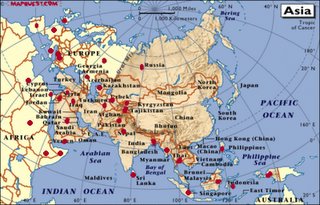
I've used this map before to explain the global nature of the war. Wherever a red dot appears a terrorist attack or continuing Islamist battle or an Islamist movement exists. By no means does this map represent all of the attacks, on going battles or organizations. Certainly, the western hemisphere is not represented showing Islamist activities in the US, Canada and South America. Certainly, this represents an extensive battle front that, were we facing it alone, the costs would be more than prohibitive. Fortunately, many states have their own survival at stake so we can rely on assistance from them, but, as pointed out, the Islamists are hoping that the over all strategy will exhaust our allies as well.
But, it is hard to see why we should be concerned about Islamist movements in Kashmir or Bangledesh or Sri Lanka or even Thailand for that matter. Those would appear to be regional with little economic or direct security impact.
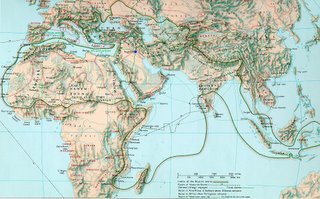 This is a map of the Ottoman Empire (caliphate) at the height of its power from the 15th to early 18th century. It's power was not derived simply by military might.
This is a map of the Ottoman Empire (caliphate) at the height of its power from the 15th to early 18th century. It's power was not derived simply by military might.  As you can see by the map to the left of the legendary "silk road", it controlled major maritime and land routes, vast amounts of raw resources including base metals, precious metals, precious and semi-precious gems, grain, rice, cotton or muslin, ink, silk, precious woods, papyrus (for making paper), tea and even part of the opium trade (just to name a few). The wealth of the empire helped to produce some of the major changes in medicine, engineering, literature, basic science and philosophy. All this long before the discovery of patroleum.
As you can see by the map to the left of the legendary "silk road", it controlled major maritime and land routes, vast amounts of raw resources including base metals, precious metals, precious and semi-precious gems, grain, rice, cotton or muslin, ink, silk, precious woods, papyrus (for making paper), tea and even part of the opium trade (just to name a few). The wealth of the empire helped to produce some of the major changes in medicine, engineering, literature, basic science and philosophy. All this long before the discovery of patroleum.By the late 17th century, the Ottoman empire began to be reduced in size by slow inroads on territory from other states and by localized revolts of indigenous populations. French, British, Spanish and Italian colonial expansion chipped away in India, Indo-china and the Philipines, then on to Africa.
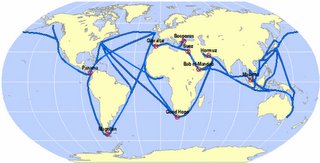 Today, Islamist organizations are attempting to regain power in many of these states. And, just like centuries past, these states sit on top of some of the world's largest natural resources and straddles the world's busiest maritime routes. The map on the right shows modern maritime routes that follow the same path as the "silk road" routes with the exception that the Suez Canal has greatly reduced the number of days that it takes to bring products and energy resources to Europe, Russia, Australia, Japan, China and the United States to name a few.
Today, Islamist organizations are attempting to regain power in many of these states. And, just like centuries past, these states sit on top of some of the world's largest natural resources and straddles the world's busiest maritime routes. The map on the right shows modern maritime routes that follow the same path as the "silk road" routes with the exception that the Suez Canal has greatly reduced the number of days that it takes to bring products and energy resources to Europe, Russia, Australia, Japan, China and the United States to name a few. 60% of Daily Oil Production is moved via seaborne tankers. Approximately 70% of that oil comes from OPEC nations which produces approximately 30% of the worlds oil. 75% of the worlds natural gas reserves are in the middle east. The EIA indicates major "choke points" and security risks:
...the Strait of Hormuz leading out of the Persian Gulf and the Strait of Malacca linking the Indian Ocean (and oil coming from the Middle East) with the Pacific Ocean (and major consuming markets in Asia). Other important maritime "chokepoints" include the Bab el-Mandab passage from the Arabian Sea to the Red Sea; the Panama Canal and the Panama Pipeline connecting the Pacific and Atlantic Oceans; the Suez Canal and the Sumed Pipeline connecting the Red Sea and Mediterranean Sea; and the Turkish Straits/Bosporus linking the Black Sea (and oil coming from the Caspian Sea region) to the Mediterranean Sea. "Chokepoints" are critically important to world oil trade because so much oil passes through them, yet they are narrow and theoretically could be blocked -- at least temporarily. In addition, "chokepoints" are susceptible to pirate attacks and shipping accidents in their narrow channels.
60% of the world's cotton is produced by China, Russia and the United States. India accounts for 14% of the world's production and 6% of imports. Pakistan and Uzbekistan are re-emerging as major players in the market. Asia is the fastest growing consumer of cotton. China accounts for 25% of the worlds consumption in steel while producing only 20% of the worlds steel. Japan is the worlds largest net exporter of steel with Russia running a close second. The fastest growing consumers of steel is Central and South America. What does this mean? Again, large amounts of raw materials are produced and shipped from and through the contested areas. Chemicals, paper, and rubber (Asia produces 85% of all rubber; Thailand is the largest single producer) just to name a few. Food, grain, clothing, technology, military supplies and many others traverse this area daily. Over 50% of the worlds seaborne tonnage goes through the Indian Ocean-East Asian maritime routes. All of which is intertwined with every existing and emerging economy as well as every industry, military and daily living.
In terms of national security and world economic stability, when people talk about disengaging from the Middle East and diversified energy technology as a way to minimize our exposure and reduce the threat from Islamic extremist terrorism, it is a very narrow, short sighted view that does not address either the over all dangers or the over all strategy of the Islamist movements and terrorism.
The long term goals of this movement is known. They seek to create an Islamic Caliphate or state that would encompass the original area of the caliphate at the height of its power. They seek to accomplish this goal by supporting Islamist movements through out these areas with the intent of creating slow (or quick) erosion and take over of the most vulnerable states. Even if all of the states within the area do not "flip" to Islamism, the creation of Islamic states in key areas would drastically change the control of key materials, production and maritime routes. If these Islamic states make economic and security compacts with one another, it would formulate the seeds of a wider "caliphate" and potentially dominate neighboring states, not to mention create whole new paradigms for inter-state and international conflict. Any and all movements in this direction could and would be used to damage or control world economics, specifically western economics.
This, as President Bush has said regarding freedom and democracy, would be the work of generations. Something that is recognized and expected by the Islamists when Zawahiri said in his last letter that they will "pass the banner" to the Islamic youth. Events such as economic depression, regional conflicts and even withdrawal of US troops that allows Iraq to de-stabilize and Islamists to establish an enclave within the borders, could speed up the achievement of these long term goals.
In the short term, reviewing the contested areas, maritime routes, materials and production, the strategy to "vex and exhaust" the United States, its allies and other target states, does not require the actual take over of any one state and does include a wider economic strategy beyond "military" or "political" cost. Generally, these movements only require that the area or country stays in turmoil, thus increasing the cost of production, exporting, importing and transporting goods as well as securing ports. For instance, 18 of 20 highest volume container ports are in South East Asia. Basically, the strategy of "a thousand cuts".
This is one of the reasons that the United States and allies are engaged in providing financial, material and military support to states like Indonesia and the Philipines to attrit these forces and maintain security. Like wise, the United States and many countries are jointly patrolling maritime routes and, in particular, "choke points". Further, we have concentrated on beefing up security at these foreign ports.
But there is an even shorter term strategy.
One of the original plans was to draw the United States into a massive invasion of Afghanistan. There hopes were to bog the US down into a long guerilla war, using massive force, costing massive money and causing massive casualties among the civilian population. They were hoping to use this to stir the Islamic populace and re-invigorate the mujihadeen. While Al Qaida had been operating bases, training forces and spreading their doctrine, their forces were degraded after the Afghan/Russo war when many of their original forces returned to their native countries. Some to start their own movements and become facilitators for Al Qaida and others simply returned to live. They did not expect the Afghan population to be turned so quickly which Zawahiri explains in his recent letter. They did not expect the US to take a different tactic from the USSR, using smaller forces backed by local mujihadeen. Basically, it did not allow them the time they they needed to draw in other resources.
For some, the use of small forces in Afghanistan was not a brilliant battle plan that contradicted the enemy's expectations, but allowed Osama bin Laden and Zawahiri to escape while a large part of their forces fought a rear guard and were killed for their efforts.
In early 2002, Zarqawi travelled to Iraq. There are questions as to whether this was for medical care or to take up Saddam's offer for assylum. In addition, 16 Al Qaida members (referred to as "leadership elements") were captured or arrested on the Iranian border with Afghanistan and are currently "hosted" in that country. There may be another question here as to whether they were simply planning to pass through Iran or had planned to seek refuge there along with bin Laden's son. In either case, Iraq serves many purposes for the Islamists. It has raw materials, it has location and it has a plethora of weapons. At the time of Zarqawi's first advent into Iraq, it still had undestroyed and barely secured remnants of nuclear, biological and chemical programs. There was money, even after the fall of Saddam.
However, one of the conditions that Zarqawi most feared was met and continues to be met as Democracy has come and, in his words, "there will be no excuses thereafter". Further, his attempts to inspire a civil war have been largely thwarted though revenge killings, incarcerations and possible torture (if not neglect) of many Sunni prisoners has become an issue. At the same time, Sunni insurgents are attempting to negotiate terms with the US and are joining the election process. As Zarqawi also noted in his February 2004 letter:
2 - We pack our bags and search for another land, as is the sad, recurrent story in the arenas of jihad, because our enemy is growing stronger and his intelligence data are increasing day by day. By the Lord of the Ka`ba, [this] is suffocation and then wearing down the roads. People follow the religion of their kings. Their hearts are with you and their swords are with Bani Umayya (the Umayyads), i.e., with power, victory, and security. God have mercy.
Iraq has been a mixed bag for the insurgents. Part recruiting tool, part public relations disaster with the larger Muslim population. Based on Zawahiri's letter directing Zarqawi to expand or move his operations to Egypt and the Levant, it may very well be that Al Qaida has decided that it needs to improve it's situation by moving to a more protected area (like the Gaza strip) where they can regroup and take on the next phase of their operations. It's certain that the Palestinian Authorities could not possibly stave off the Islamists and no country is liable to enter there with the continued Israeli/Palestinian conflict that could "inflame" the Muslim world. Exactly what they are hoping for.
Other advantages include an already fanatical base, closer to Zawahiri's known associates. If the US pulls out early from Iraq, then it is nearly guaranteed that western Iraq will be maintained as a base of operations or an emirate.
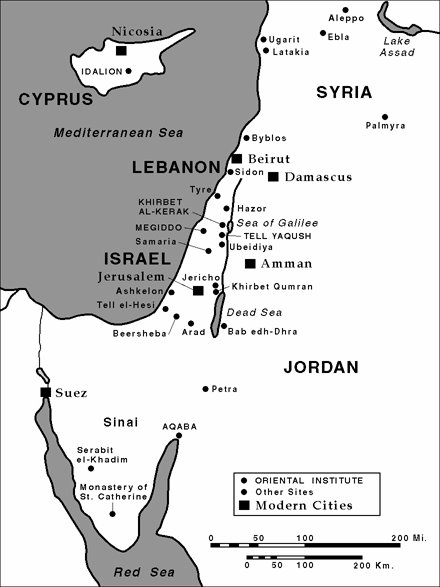 If Al Qaida is able to more firmly attach their fortunes to the Israel/Palestinian struggle, it could lead to an even better recruiting tool. Attacks on Israel would hinder or slow down the peace process and Israel may go on a larger offensive that would also serve to increase tensions. In addition, as part of the strategy of "a thousand small cuts", operating in Egypt, Gaza and Jordan would offer an even better opportunity to impact the "cost" effect, not just for the US, but for Europe, Africa, Russia and any country whose imports or exports travel through the Suez Canal.
If Al Qaida is able to more firmly attach their fortunes to the Israel/Palestinian struggle, it could lead to an even better recruiting tool. Attacks on Israel would hinder or slow down the peace process and Israel may go on a larger offensive that would also serve to increase tensions. In addition, as part of the strategy of "a thousand small cuts", operating in Egypt, Gaza and Jordan would offer an even better opportunity to impact the "cost" effect, not just for the US, but for Europe, Africa, Russia and any country whose imports or exports travel through the Suez Canal.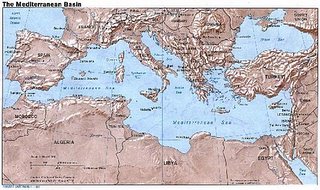 It would not be necessary to actually hold all of the land or even part of it. At most, they would need occasionally interdict shipments, target them with rockets, or even simply cause the area to be so unstable that the risk (thus, the cost) is extremely high for traversing the Suez Canal. This would interrupt goods traveling to and eventually through the Mediteranean.
It would not be necessary to actually hold all of the land or even part of it. At most, they would need occasionally interdict shipments, target them with rockets, or even simply cause the area to be so unstable that the risk (thus, the cost) is extremely high for traversing the Suez Canal. This would interrupt goods traveling to and eventually through the Mediteranean.For countries like France and Germany with low GDP and high unemployment, pressure on their economy could be especially devestating. That goes for the emerging economies of the former Eastern Bloc countries. Further, operational proximity to Europe could allow for an intensification of attacks. Last, Islamists from Algiers, Somalia and Sudan (to name a few) could provide a base for a much wider conflict.
Whatever the narrow short term goals or the more extensive long term goals, Al Qaida and Islamists need to obtain and hold an area for a base. They need:
a)A victory or even a "draw" that leaves them in possession of some land where they can not only operate, but set up a model society; to inspire people with their deeds and their governance.
b) The area must be relatively secure so that the Islamists can bring people to train and be indoctrinated
c) The area needs to have a resource or resources that can be sold on the open market or the underground market to have a secure financial base
d) Proximity to a base of like minded individuals that would be inspired to act within their own countries.
They need to do what the US is doing in some small way. The problem is, their original model in Afghanistan fell apart because the Taliban's rule had not convinced the people that it was just and right. Some how, Zarqawi thinks that an even more repressive government, as has been seen in the towns he and the mujihadeen have taken control of, is a better model than the Taliban.
This base of operation will need not only land, but people and resources in order to take the war to the next level. Without a place to declare victory and consolidate their position, their ideology will continue to be marginalized and possibly wane.
It was interesting to read in Zawahiri's last letter that he felt the struggles in East Asia were less important than establishing a base in "the heart of Islam". It may be that these areas, while important in the "thousand cut" strategy, are too far away from the main body of would be supporters, do not have sufficient resources, are largely islands that would be difficult to secure against naval, land and air invasion and would be tantamount to painting themselves into a corner. So, these battles are supported as they are in the interest of the movement, but do not represent a place that the movement wants to set up a base. These areas would be incorporated later to "consolidate" the three major points of the Caliphate: Africa; Middle East; East Asia.
Like wise, while Pakistan provides some cover for Al Qaida and draws large numbers of young men every year to "study", Al Qaida no longer enjoys total support by the government and, in many respects it does not meet a few important requirements for a base of operations. Mainly, it is still far away from the ideological center of Islam; the Pakistani Army is beginning to pursue them in the areas they once felt most secure; it has no significant resource that could finance their effort.
In order to press the advantage, the United States needs to:
a) Deny the enemy secure, uncontested territory
b) In the least costly manner possible or with calculated costs that have some sort of dividend (ie, the peace dividend)
c) Deny the enemy resources in any area that may be used to develop or purchase weapons or other assistance.
d) Continue to close their financial capabilities. It is largely understood that Zarqawi was paying many "insurgents" to take action like a small criminal mercenary army and at the same time, extorting money from the locals as "protection" money to use in these endeavors and angering the locals.
e) Sustain a low intensity war, either special forces or multiple short term wars that attrit forces and deny security and demoralize the base.
f) Continue diplomatic push to create more open societies, but will need evaluate the cost of leaving them in power and maintaining stability compared to the potential cost to benefit ratio should that country be toppled ie, is there a more intense pro-Islamist movement within the country that would provide a base for insurgency, more robust than seen in Iraq or can the regime be led to provide more open society without destabilizing?
I believe the last question will need to be carefully weighed, but I also believe that the calculation of what regime is "cooperative" and stays intact verses an "uncooperative" regime and total take down, is vastly different than the Cold War detente model.
Jihadists Agree: Fight in Iraq Central To War on Terror
Why al Qaida is Fighting For Iraq
Two Views of Iraq War
Iraq "Insurgency" Review
Other:
Islamic Throught and Terrorism




















No comments:
Post a Comment